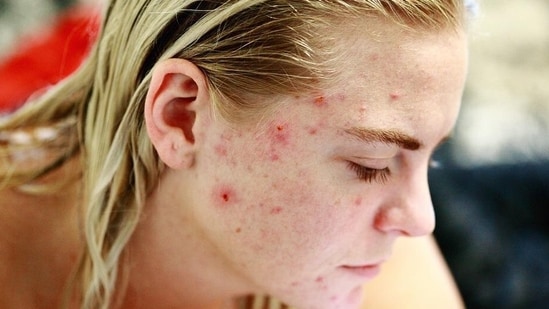Endometriosis can cause acne; follow these natural remedies to manage it
Dermatologist Dr Rinky Kapoor suggests home remedies to manage acne triggered by endometriosis. All you want to know.
Apart from the many complications that come with endometriosis, a condition where some tissues develop outside the uterine lining disrupting the normal structure and causing pain around the uterus, it can also give you acne. The condition can make your skin sensitive and prone to inflammation that increases the risk of pimples, painful cysts, blackheads and whiteheads. (Also read: Endometriosis: Foods to eat or avoid, exercise tips, lifestyle changes to make)

Dr. Rinky Kapoor, Consultant Dermatologist, Cosmetic Dermatologist & Dermato-Surgeon, The Esthetic Clinics says that apart from painful periods, discomfort during and after intercourse, pain during urination, blood in stool, difficulty in conceiving, bloating, sciatic nerve pain, recurring acne, and excessive bleeding, endometeriosis acne affects around 1% of women "but it is the most frustrating, visible and confidence-destroying symptom of endo."
"Endometriosis causes hormonal imbalance which is a big aggravator of acne and other reasons include excess sebum production which causes the pores to block," says Dr Kapoor.
The dermatologist also suggests home remedies and treatment methods that help manage endometriosis acne:
The expert says the first line of treatment is to correct the hormonal treatment and birth control pills are prescribed to manage the acne and endometriosis.
Here are other precautions and treatment techniques:
· Keep your hands off pimple and avoid picking the pimple at any cost
· Use a warm compress to reduce the inflammation
· Acne dot hydrocolloid bandage and benzoyl peroxide products are common options a home treatment for cystic and other forms of acne.
· If you notice the acne become tender to touch or if fluid is draining from it then consult your dermatologist who can use steroid injections to reduce acne inflammation.
· In over the counter medications look for products with salicylic acid in cleansers, gels, and creams to reduce the acne.
· With your dermatologist’s consultation you can include retinoid in your night time routine to cleanse the skin.
What you can do at home
· Sleep and exercise: Get proper sleep of minimum of 8 hours. It will help regulate the hormones and calm the skin. The same is with exercise, it helps balance hormones and controls acne.
· Be careful with makeup and skin care: Your skin care and makeup should suit your skin type. Products that clog the skin increase the chances of acne. Therefore, opt for products that are paraben free, sulfate free, non-comedogenic and free of mineral oils.
· Pay attention to stress: The more you take stress the more it will get worse. Find and eliminate the stress triggers.
· Drink water: Waters removes toxins from the body and reduces blemishes and breakouts. A minimum of 3 litres per day should be your target.
· Use a facial brush: Gently brushing with a silicone facial brush will cleanse the skin and stimulate blood flow. This way your skin will get rid of dirt and grime and keep the acne in control.
· Cleanse and moisturize your skin every morning and night: This is the most important step to skin care when suffering from acne. Cleansing removes the dirt and traces of makeup and moisturizer keeps the skin supple and healthy.
"Most women notice an increase in acne a week and 10 days before their periods are about to start. And therefore, make sure that you take extra care of your skin during that time. Consult your dermatologist if the acne does not come in control," concludes Dr Kapoor.
Catch your daily dose of Fashion, Health, Festivals, Travel, Relationship, Recipe and all the other Latest Lifestyle News on Hindustan Times Website and APPs.



